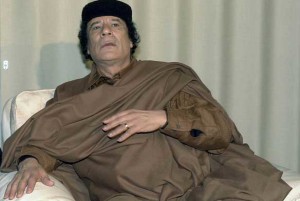Gaddafi: The Thousand Shades of the Libyan Dictator
By Aqil Razzaq | Blog row | News & Politics | The Water Cooler | Published 14 years ago
 Looking outside the window of my suburban home in Tunis, I notice the gloomy sky and the chilly weather as autumn nears its end and winter sets in. Yet there is a sense of festivity outside. Car horns honk in joy, people on the streets congratulate each other, flags are waving everywhere. For today is a historic day. Today is the end of Muammar Gaddafi.
Looking outside the window of my suburban home in Tunis, I notice the gloomy sky and the chilly weather as autumn nears its end and winter sets in. Yet there is a sense of festivity outside. Car horns honk in joy, people on the streets congratulate each other, flags are waving everywhere. For today is a historic day. Today is the end of Muammar Gaddafi.
This moment sends me back in time to February when I started working on the Libyan-Tunisian border as an aid worker at the start of the Libyan revolution. It reminds me of my interaction with the scores of people fleeing Libya and their views about the man named Gaddafi. Hearing all the tales from people who experienced his rule firsthand made me realise the intricacies of his story. (Read about Pakistani workers fleeing Libya here.)
The story of Gaddafi is a story full of mystery and surprise, joy and sorrow, life and death. It’s the story of a poor Bedouin boy’s rise to power as the self-proclaimed “King of Africa.” It’s a story of many twists and turns with the man at one point being labelled “public enemy number one” by the United States and later becoming an ally in the fight against Al-Qaeda. It’s this confusing nature of his story that has had him labelled as dynamic as well as delusional.
Gaddafi’s rise to fame came at an early age, when in 1969 as a young 27-year-old lieutenant of the Libyan Army he led a bloodless coup against King Idris of Libya (who had reigned since 1951), abolishing the monarchy and establishing a republic. He was welcomed to power by thousands of Libyans cheering for him in the streets. Ironically, after 42 years, thousands of Libyans are again cheering in the streets, but this time they are celebrating his death.
Gaddafi wanted himself to be a constant factor in Libyan politics. His personality however, was anything but constant. He was a man claiming to implement Islamic shariah yet he tightly controlled religious sentiments. He was a man championing the cause of Arab nationalism yet he was at odds with other Arab nations. He was a man claiming to favour democracy yet he ruled his country, along with his family, with an authoritarian grip for over four decades. He claimed to liberate people yet he did not tolerate dissent. It is this contradictory nature of the man that confuses many observers.
On one hand, Gaddafi provided Libyans with many facilities such as social security and subsidies for almost every necessity. Life was cheap and peaceful. On the other hand, he deprived them a modern education and healthcare system. Despite being the most oil-rich African country, Libyans have to travel to Tunisia for medical treatment. Even before this civil war, the infrastructure of the country was in a dismal state. A Libyan refugee once told me that Gaddafi planned to turn Libyans into cattle: fat and well fed but incapable of independent thought. His supporters in turn argue that the backwardness of Libya despite its rich resources was a result of his refusal to take foreign orders.
After coming to power, Gaddafi initially tried to rule his country by using the carrot-and-stick approach. But as years turned into decades, the proportion of the stick increased compared to that of the carrot. By the end, he was a man promising a bloodbath, calling opponents rats and vowing to eliminate them, street by street, house by house. He may have come to power saying that he would rule with affection, but ended up ruling with fear.
On the international stage, Gaddafi initially seemed keen to achieve global anarchy by supporting every other rebellious movement in countries far and wide. The former terrorist group Al-Zulfiqar in Pakistan was also said to have received funding from Gaddafi. Yet all that changed in the later stages of his rule when he sought international recognition, ended support of militant groups, gave up his nuclear programme and decided to join the international fight against terrorism.
Behind the celebrations, some Libyans are already starting to question the wisdom of rebelling against Gaddafi. Whispers among some of the well-to-do Libyans taking refuge in Tunis already show a hint of remorse and a sense of longing for the stability that Gadhafi provided their nation. Some call it a temporary reaction to images of their country in ruins. Others say it is a calculated assessment based on the divided nature of Libyan society and low levels of education. Who is right, only time will tell. Even after Gaddafi’s death, however, Libya’s future is more uncertain than ever.
A madman or genius, a dictator or a leader, a murderer or a martyr, whatever Gaddafi was, one thing is for sure: he was a man of his word. He promised to die in his land fighting, and it seems he stood by his word till the end.
For more on the Arab Spring, click here.
Additional tags: Moamar Gaddafi, Muammar Gadhafi, Libya, Arab Spring


